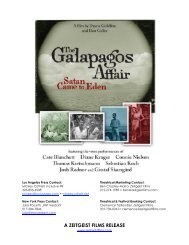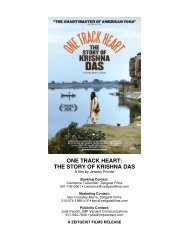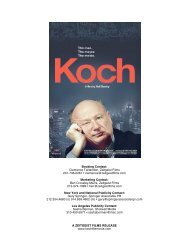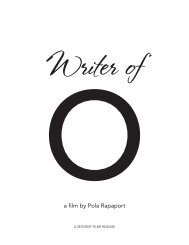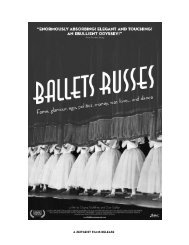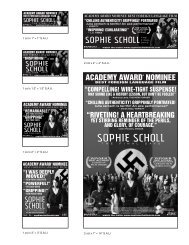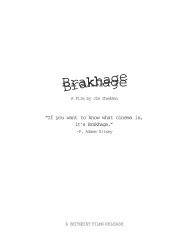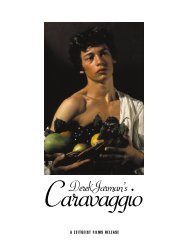You also want an ePaper? Increase the reach of your titles
YUMPU automatically turns print PDFs into web optimized ePapers that Google loves.
cinematographer, “Pull back! More detached!” In Hou, history inheres in the everyday,<br />
and the aim of his remote camera, which moves laterally or parks itself at a distance to<br />
observe, is, paradoxically, empathy and intimacy. Similarly, <strong>Jia</strong>’s watchful style, which<br />
suspends time and forces attention to social detail in XIAO WU, imposes tableaux and<br />
frieze-like compositions on the restless itinerants of PLATFORM, and conversely roves<br />
and floats in the weightless DV mobility of UNKNOWN PLEASURES, is employed with<br />
almost ethnographic objectivity, but achieves greater emotional effect than any heavy<br />
editing or close-up. “If I were to break up a scene which lasts for six or seven minutes<br />
into several cuts,” <strong>Jia</strong> has said, “then you lose that sense of deadlock. The deadlock that<br />
exists between humans and time, the camera and its subject.” To the impatient, <strong>Jia</strong>’s<br />
“deadlock” will translate as aloofness or aesthetic impasse, but his withholding pays off,<br />
as we shall see, in poignancy.<br />
<strong>On</strong>e could list many other similarities between Hou and <strong>Jia</strong>, including their marked<br />
sympathy for unmoored youth—though <strong>Jia</strong>’s is more autobiographical, Hou’s more<br />
distantly empathic—and concern with identity (national, individual); their elliptical<br />
narratives, complex employment of offscreen space, and acute awareness of how history<br />
impinges upon the personal; their vivid sense of landscape, use of pop music as both<br />
catharsis and commentary, neo-Brechtian emphasis on performance (<strong>Jia</strong>’s films are full<br />
of dances, songs, shows), and—most markedly—their tragic sense of life as an accrual<br />
of loss and injury, of broken or vanished ideals and irretrievable loves. Some of their<br />
films could profitably be paired to reveal affinities of theme, shooting style, or narrative<br />
approach: Hou’s THE PUPPETMASTER with <strong>Jia</strong>’s PLATFORM, GOODBYE SOUTH<br />
GOODBYE or THE BOYS OF FENGKUEI with UNKNOWN PLEASURES, MILLENNIUM<br />
MAMBO with THE WORLD.<br />
Though <strong>Jia</strong> lists, along with Chen Kaige’s YELLOW EARTH, Bresson’s A MAN ESCAPED<br />
and De Sica’s THE BICYCLE THIEF, Hou’s FENGKUEI as one of his formative influences<br />
and pays homage to it with an intertitle “The Boys of Fenyang” in the version of THE<br />
WORLD released in China, <strong>Jia</strong>’s debt to Hou can be overstated. <strong>Jia</strong>’s aesthetic, at least<br />
in the early films, owes more to neorealism and documentary, even reportage, than does<br />
Hou’s, and his singular, designed audioscapes, which incorporate copious amounts of<br />
stray or found sound in their inquisitive richness are markedly different from those of<br />
Hou. Neither does <strong>Jia</strong>’s interest in history have the magisterial reach of Hou’s epics; the<br />
younger director sticks mostly to what he knows from direct observation. <strong>On</strong>e cannot<br />
quite imagine in a Hou film the welter of contemporary political references in<br />
UNKNOWN PLEASURES: the bombing of a textiles plant, crackdowns on Falun Gong,<br />
China’s entry into the World Trade organization, a collision between US and Chinese



